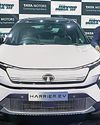
Tata Motors and Mahindra & Mahindra, the homegrown car makers have emerged as strong winners post Covid-19. As figures have proven, they have found higher acceptance in 2022 than the cars and SUVs made by the Hyundai Motor Group in India.
For the first time in more than a decade and a half, Indian brands have actually outsold successful Korean models in the country.
A strong portfolio of SUVs, growing theme of "vocal for local" and superior value proposition with a core focus on safer and cleaner vehicles helped Indians inch ahead of Korean brands in a highly competitive market.
Autocar Professional learns that in the year gone by Tata Motors and Mahindra & Mahindra combined sold a total of over 8.5-8.7 lakh vehicles. This is against 8.2-8.3 lakh vehicles of Hyundai-Kia combined.
In 2021, the sales of Indian brands trailed the Koreans by a whopping 1.5 lakh units, but a series of new launches from Mahindra & Mahindra and Tata Motors in the last 12-18 months helped Indian brands bridge the gap and even overtake the Koreans.
Tata Motors introduced the entry SUV Punch which brought in a lot of hatchback and sedan buyers into the company adding 10,000 units a month of incremental numbers for the company, even as the electric version offered a strong tailwind to the Nexon franchise, which took it to the podium of SUVs in 2022.
At the same time of Mahindra & Mahindra's sustained product excitement post-Thar and XUV 700 launch with the addition of new Scorpio N helping the Mumbai-based SUV specialist to double its monthly volumes to about 34,000 units a month at the end of the year.
Esta historia es de la edición 1st January 2023 de Autocar Professional.
Comience su prueba gratuita de Magzter GOLD de 7 días para acceder a miles de historias premium seleccionadas y a más de 9,000 revistas y periódicos.
Ya eres suscriptor ? Conectar
Esta historia es de la edición 1st January 2023 de Autocar Professional.
Comience su prueba gratuita de Magzter GOLD de 7 días para acceder a miles de historias premium seleccionadas y a más de 9,000 revistas y periódicos.
Ya eres suscriptor? Conectar

Spain's Fersa Group invests in India-based Delux Bearings
Besides theRs100 croreinvestment, the Indian company gets access toadvanced technologies and bearings with arange of applications that willhelpinits global growth strategy, writes Manobhava Baruah.

Tata Autocomp to open compact dual-clutch transmission plant
Amidthe country’s growing need for personal mobility with easy manoeuvrability, comes the demand for vehicles with automatic transmission. Tata AutoCompisready tomovein writes Shruti Mishra.

Pankaj Munjal-backed Hero Motors raises equity from GEF Cap
The company willinvest Rs1,500 crore over thenextthree years andit expects 60 percent ofits turnover to come fromelectric vehicle parts. Itaims to becomea Global EV Solutions Company from India

New age thermoplastics for next-generation EV batteries
Saudi-based global materials major SABIChas developed cutting edgein fire-resistant polymers and flame-retardant materials that comply with various EV battery safety standards across the world.

Switch Mobility to meet growing e-bus demand with fresh capex
Oncourse for abillion-dollar business, the company is exploringa possibility of operating satellite factories across the country to serve different geographies, write ShahkarAbidi and Ketan Thakkar.

Kia India to invest Rs 2,000 crore in EVS, to introduce new e-RV in 2025
New investmentto drive R&D, infrastructure development and manufacturing capabilities. The company willlocally produce EVsin India with possibility of exports as well, writes Mayank Dhingra.

"The government has given enough time for indigenisation but the industry has not taken it seriously"
Amitabh Saran, Founder and CEO, Altigreen, shares his views on problems inthe EV industry and battery localisation solutions with Amit Vijay M.

TATA MOTORS SEES ONE INTWO CARS SOLDAS EVS BY 2030
The company aims to offer wider choices withnew EVs that may straddle a pricebracket of Rs20to 40lakhinthe coming years, writes Ketan Thakkar.

MG Motor India in expansion drive, to invest $100 million
The investment willbe usedtoramp up existing production capacity from1.2to1.4-15lakh units per annum atthe automaker's Halol plantin Gujarat, writes Ketan Thakkar.

"Technology and its multiplier effect are driving business transformations and customer experiences"
Technical Centre India is one of Continental’s largest research and development centres in the world, andasa Centre of Competence’ it also develops customised products for the BRIC countries.